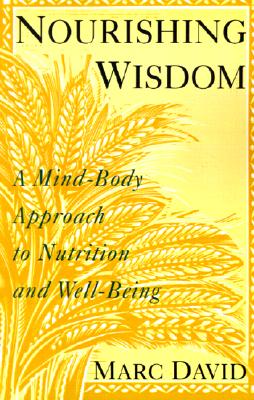… is what they claim on the back of Marc David’s Nourishing Wisdom.
Cocky? Sure, but I couldn’t agree more!
I read this book recently and I absolutely adore its message. Basically what David argues is that there really is no such thing as “good food” or “bad food”. In order to have a healthy relationship with food – and good health, of course – we need to get our heads out of the science behind nutrition and try to be more grounded in a mind-body approach to eating.
This book is filled to the brim with little nuggets of wisdom that would resonate with everyone, and he talks a lot about things that we all kind-of-sort-of know and have heard before (like why it’s important to chew your food, for one) but the way he explains things made it really interesting and fun to read. I was nodding eagerly to myself the whole time reading it and I became a lot more conscious of why and how I eat after finishing the book.
Here are some of my key take-aways:
- Your body’s needs changes with the seasons and according to where you’re living geographically. That’s just a fact. So for example, a year-round raw food diet is just bullocks to anyone not living in Fiji. You have to learn to read what your body needs because it will always tell you. Always.
- We should try to stop labeling certain foods as bad. It only makes your mind crave them and the guilt you feel for eating them will make it un-digestable. It’s not the cake in itself that’s necessarily bad for you, but it’s all the negative feelings you’re filling your mind and body with because you ate it.
- Try not to be judgmental of what other people eat. If you’re a carnivore, try a vegan diet for one week as an experiment. Taste the food, experience it. See that you’re still the same cool person you were before even if you’re eating “rabbit food”. If you’re a vegetarian, maybe eat your grandmother’s Thanksgiving turkey for once. It won’t kill you. But the beaming smile on your grandmother’s face might turn that turkey into the best thing you’ve ever tasted.
- We don’t just need nutrients – we need the experience of food. We need to chew it. We need to taste it. We need to enjoy it. In one of my favorite chapters of the book, David described an experiment that scientists did with rats. They gave them literally all the nutrients and building blocks a body needs to survive in the form of injections, and they kept this up for weeks. The rats all got weaker and weaker and eventually died. Because it turns out that you cannot replace the experience of eating food even though you have every single thing the body needs to survive in pill form.
- Essentially what we keep forgetting, much thanks to advertising and marketing, is that one size does not fit all. Every single body that has ever existed on planet Earth is unique in its kind. We are all little snowflakes, guys. What works for Bob does not necessarily work for Dave. What works for Jia Minh does not necessarily work Ahmed Hassini. It’s really quite logical when you think about it. Is it true that some people have cured their cancer through a strict macrobiotic diet? Absolutely. Does it mean every single person in the world with cancer can cure it through eating a strict macrobiotic diet? No, sir. This is something we’re just going to have to accept at some point, but every year some new miracle diet appears on the bestselling books lists and people buy into it because it worked for the person who wrote book.
It’s not a new book by any means (first published in ’91) but just as important today, I reckon, even though there is definitely been a bit of a health and wellness revolution going on in recent years…
I loved reading this book because it made me aware of a lot of things that I think we all tend to forget. The importance of simply listening to your body’s needs and picking up on the signals it is constantly sending. The importance of being mindful of your surroundings when you eat. The importance of how you eat (posture, sitting at a table, paying attention). The value that is enjoying a meal in good company with others.
If you’re remotely interested in food and nutrition, this book is a must.
If you’re just a person who eats, I think you should read it to.
Xx Christine
